新概念2 Lesson 36 Across the channel教学课件(共67张PPT)
文档属性
| 名称 | 新概念2 Lesson 36 Across the channel教学课件(共67张PPT) | 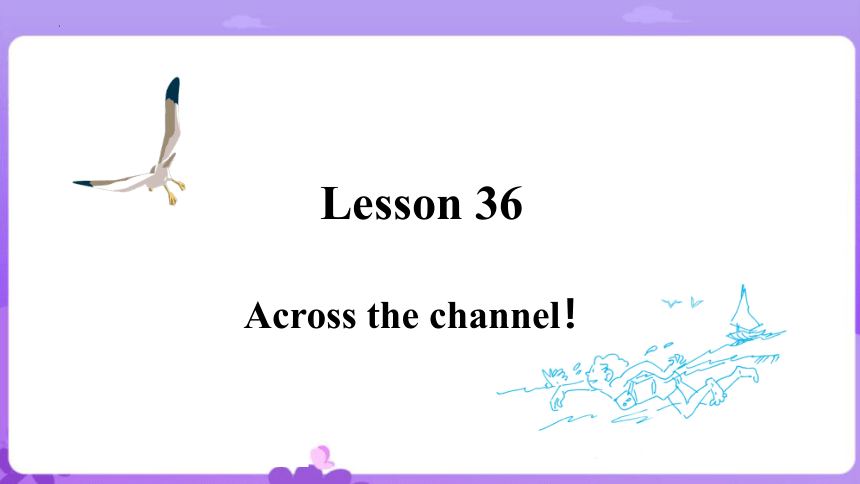 | |
| 格式 | pptx | ||
| 文件大小 | 6.2MB | ||
| 资源类型 | 教案 | ||
| 版本资源 | 新概念英语 | ||
| 科目 | 英语 | ||
| 更新时间 | 2024-03-24 16:59:25 | ||
图片预览

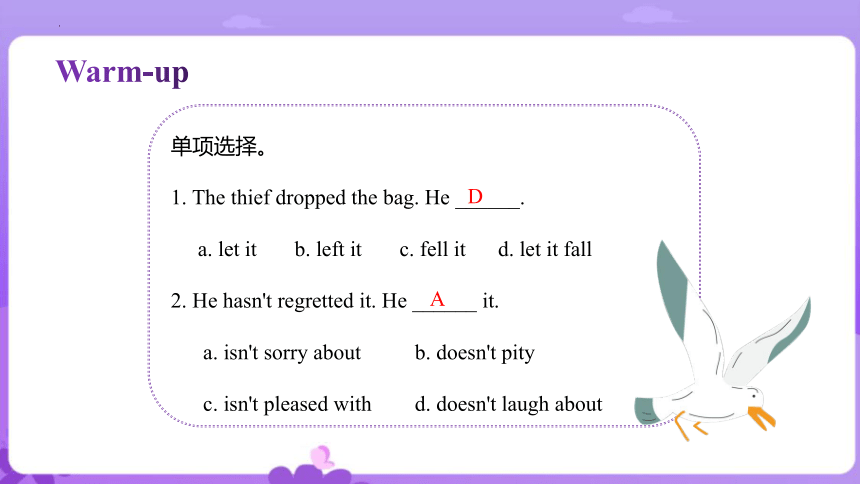
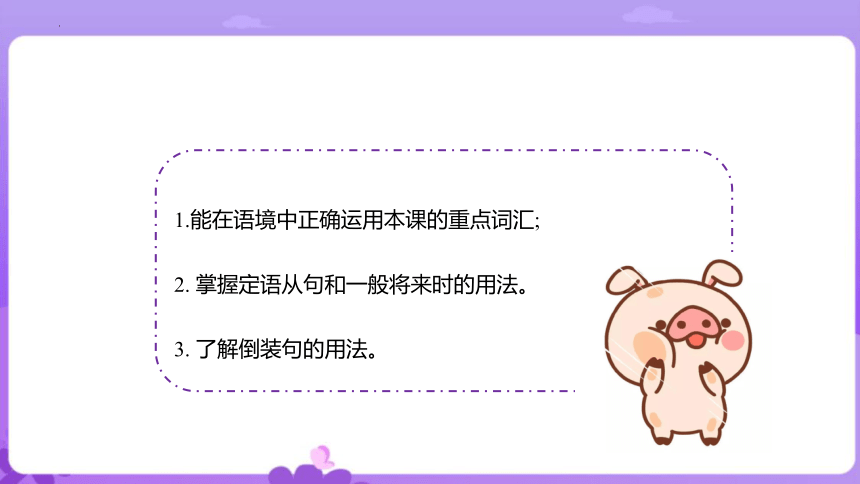

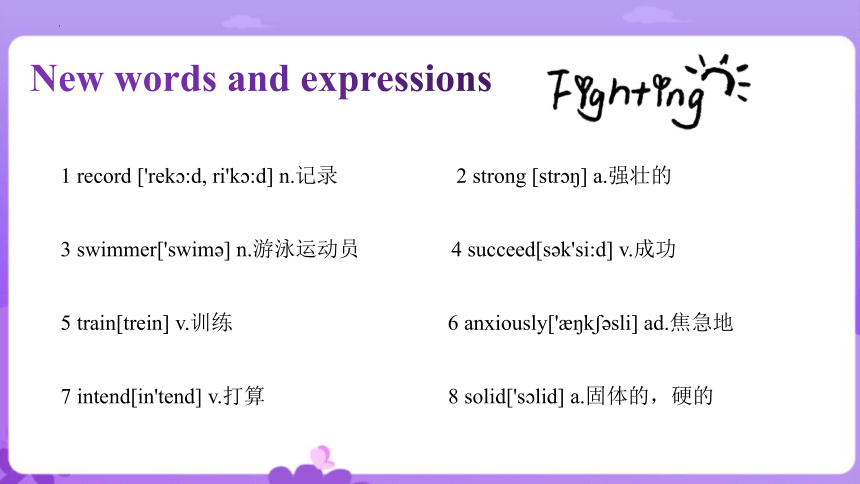
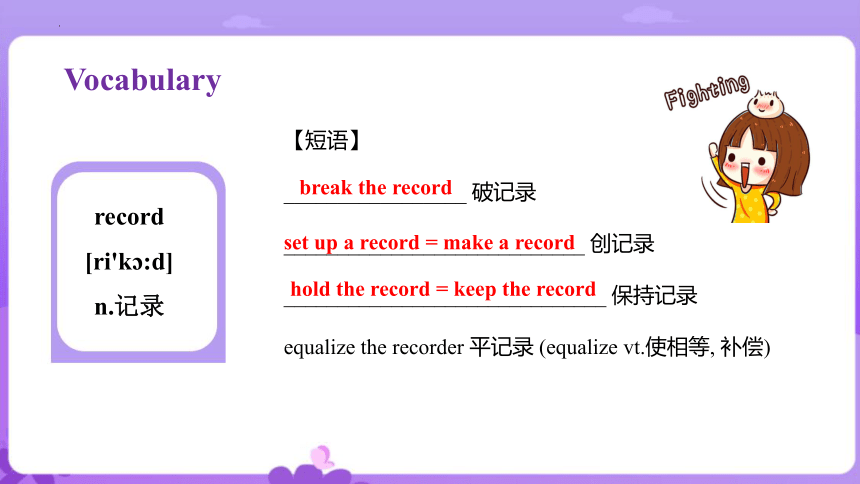
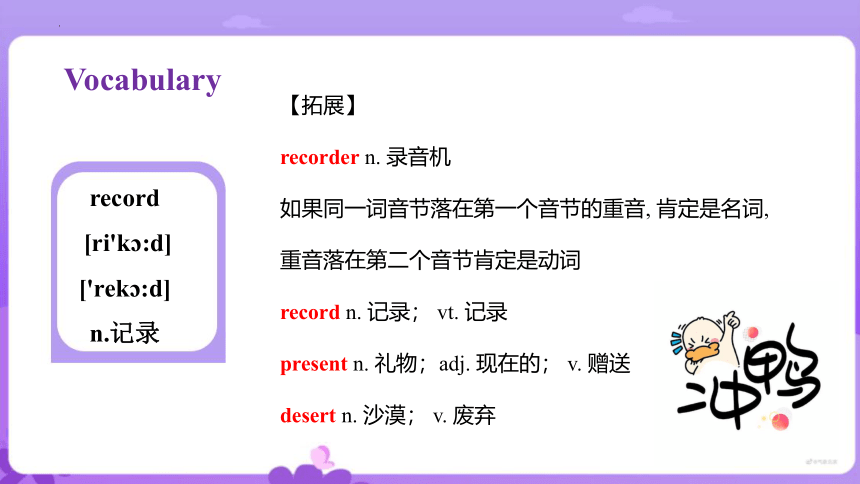
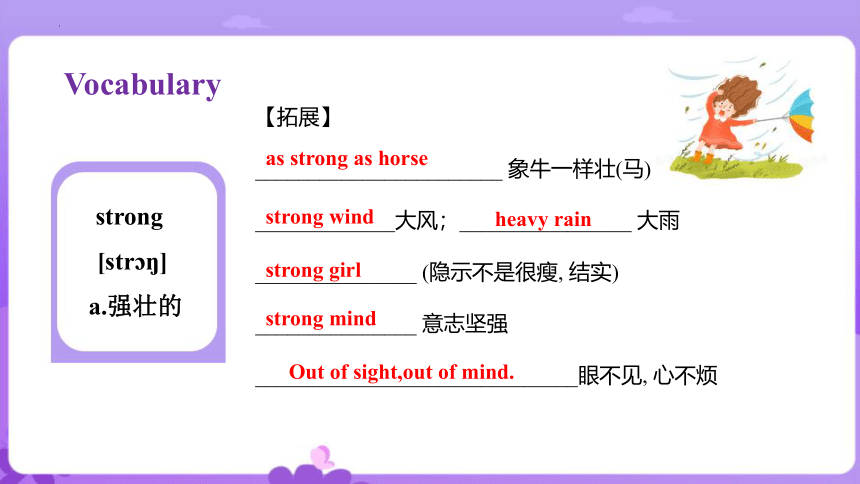
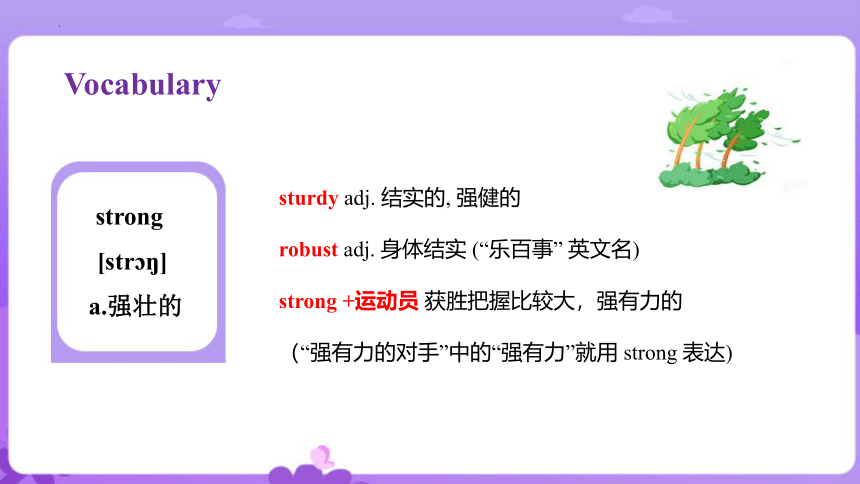
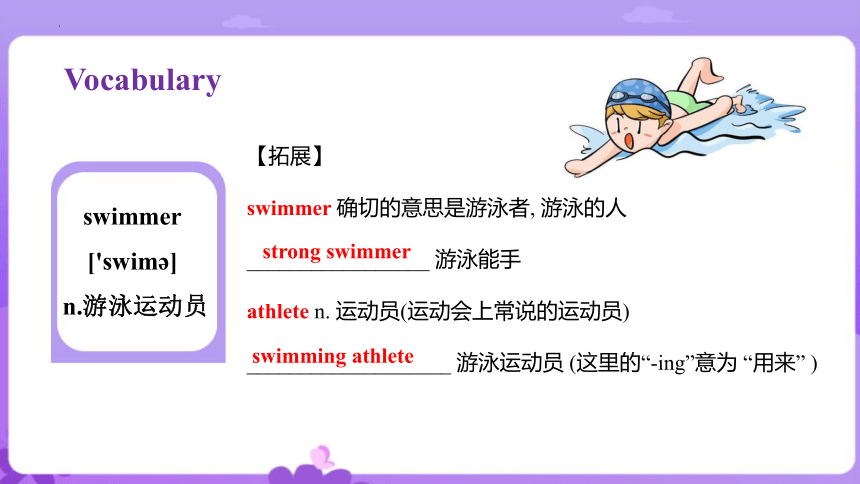

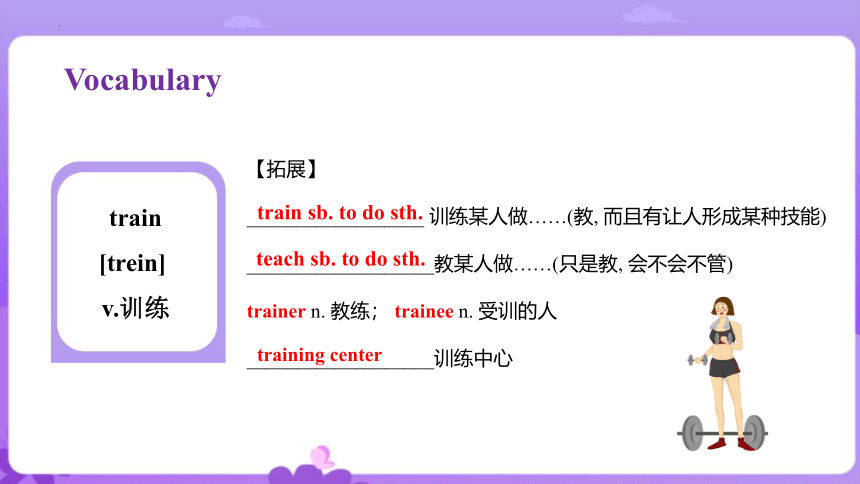
文档简介
(共67张PPT)
Lesson 36
Across the channel!
Warm-up
单项选择。
1. The thief dropped the bag. He ______.
a. let it b. left it c. fell it d. let it fall
2. He hasn't regretted it. He ______ it.
a. isn't sorry about b. doesn't pity
c. isn't pleased with d. doesn't laugh about
D
A
1.能在语境中正确运用本课的重点词汇;
2. 掌握定语从句和一般将来时的用法。
3. 了解倒装句的用法。
Vocabulary
New words and expressions
1 record ['rek :d, ri'k :d] n.记录 2 strong [str ] a.强壮的
3 swimmer['swim ] n.游泳运动员 4 succeed[s k'si:d] v.成功
5 train[trein] v.训练 6 anxiously[' k sli] ad.焦急地
7 intend[in'tend] v.打算 8 solid['s lid] a.固体的,硬的
【短语】
_________________ 破记录
____________________________ 创记录
______________________________ 保持记录
equalize the recorder 平记录 (equalize vt.使相等, 补偿)
record
[ri'k :d]
n.记录
Vocabulary
break the record
set up a record = make a record
hold the record = keep the record
【拓展】
recorder n. 录音机
如果同一词音节落在第一个音节的重音, 肯定是名词,
重音落在第二个音节肯定是动词
record n. 记录; vt. 记录
present n. 礼物;adj. 现在的; v. 赠送
desert n. 沙漠; v. 废弃
record
[ri'k :d]
['rek :d]
n.记录
Vocabulary
strong
[str ]
a.强壮的
Vocabulary
【拓展】
_______________________ 象牛一样壮(马)
_____________大风;________________ 大雨
_______________ (隐示不是很瘦, 结实)
_______________ 意志坚强
______________________________眼不见, 心不烦
as strong as horse
strong wind
heavy rain
strong girl
strong mind
Out of sight,out of mind.
strong
[str ]
a.强壮的
Vocabulary
sturdy adj. 结实的, 强健的
robust adj. 身体结实 (“乐百事” 英文名)
strong +运动员 获胜把握比较大,强有力的
(“强有力的对手”中的“强有力”就用 strong 表达)
【拓展】
swimmer 确切的意思是游泳者, 游泳的人
_________________ 游泳能手
athlete n. 运动员(运动会上常说的运动员)
___________________ 游泳运动员 (这里的“-ing”意为 “用来” )
swimmer
['swim ]
n.游泳运动员
Vocabulary
strong swimmer
swimming athlete
【拓展】
success n. 成功, 成功的人 successful adj. 成功的___________________ 做……成功
____________________________
fail v. 失败 _____________________ 做……失败
failure n. 失败, 失败者, 缺乏, 失灵, 故障, 破产, 疏忽,
<美>不及格
succeed
[s k'si:d]
v.成功
Vocabulary
succeed in doing sth.
be successful in doing sth
fail to do sth.
【拓展】
__________________ 训练某人做……(教, 而且有让人形成某种技能)
___________________教某人做……(只是教, 会不会不管)
trainer n. 教练; trainee n. 受训的人
___________________训练中心
train
[trein]
v.训练
Vocabulary
train sb. to do sth.
teach sb. to do sth.
training center
【拓展】anxious adj. 焦急的
【例句】_________________________________
她急切地端详着他的脸。
anxiously
[' k sli]
ad.焦急地
Vocabulary
She scanned his face anxiously.
【拓展】
打算做某事_______________________________
【例句】____________________________________
你打算拿这孩子怎么办?
intend
[in'tend]
v.打算
Vocabulary
What do you intend to do with the child
intend to do sth.=be going to do sth.
【拓展】
① adj. 固体的
____________________________
② adj. 硬的,结实的,坚固的(指家具、建筑物等)
______________________
③ n. 固体
solid
['s lid]
a.固体的
Vocabulary
She will not eat any solid food.
The ice is solid. 冰很硬。
Text
Debbie Hart is going to swim across the English Channel tomorrow. She is going to set out from the French coast at five o'clock in the morning. Debbie is only eleven years old and she hopes to set up a new world record. She is a strong swimmer and many people feel that she is sure to succeed. Debbie's father will set out with her in a small boat. Mr. Hart has trained his daughter for years. Tomorrow he will be watching her anxiously as she swims the long distance to England. Debbie intends to take short rests every two hours. She will have something to drink but she will not eat any solid food. Most of Debbie's school friends will be waiting for her on the English coast. Among them will be Debbie's mother, who swam the Channel herself when she was a girl.
Debbie Hart is going to swim across the English Channel tomorrow. She is going to set out from the French coast at five o'clock in the morning. Debbie is only eleven years old and she hopes to set up a new world record. She is a strong swimmer and many people feel that she is sure to succeed. Debbie's father will set out with her in a small boat. Mr. Hart has trained his daughter for years. Tomorrow he will be watching her anxiously as she swims the long distance to England. Debbie intends to take short rests every two hours. She will have something to drink but she will not eat any solid food. Most of Debbie's school friends will be waiting for her on the English coast. Among them will be Debbie's mother, who swam the Channel herself when she was a girl.
Across the Channel
across 横渡
the Channel=the English Channel 英吉利海峡
(当“C”大写时, 一定是指 the English Channel)
She is going to set out from the French coast at five o'clock in the morning.
set out 出发; set out from… 从某地出发
Debbie is only eleven years old and she hopes to set up a new world record.
创立,建立
hope to do sth. 希望自己做……
hope that+从句 希望别人做……
hope for 期待
Everyone hopes for snow.
She is a strong swimmer and many people feel that she is sure to succeed.
表语从句
feel (that) +从句 认为……,相信……(宾语从句中的 that 可以省略)
My parents feel that they can believe in you.
She is a strong swimmer and many people feel that she is sure to succeed.
be sure to do sth. 一定能够, 必定会
(肯定语气比“must”(must + 动词原形,表示一定, 一种推测)
be sure of… (对某件事情, 名词做宾语)
be sure that… (对某件事情, 某人做某事有把握)
I am sure that I can do sth.=I am sure of sth.=I am sure to do sth.
I am sure of my success. = I am sure to succeed.
I am sure that I can succeed/be successful.
Debbie's father will set out with her in a small boat.
...with her 同她一道
by boat , in a boat 乘船
Tomorrow he will be watching her anxiously as she swims the long distance to England.
will be doing 将来进行时表达将来
as=when
swim + 距离 游过多长距离
All the world will be watching anxiously as the war broke out.
We will be watching anxiously as you went (go) out. (牵挂).
将来进行时表达将来
Debbie intends to take short rests every two hours.
rest 作“休息”讲时,可以是可数名词,也可以是不可数名词:
Today is my day of rest. 今天是我的休息日。
After a long rest, he went on with his work.
have(take) a break(rest) 休息
take short rests 休息短时间
every 用在表示时间的名词之前时可译为“每”,every two hours 每两个小时
I will plant another tree every three trees. 每隔三棵树我会再种一棵
She will have something to drink but she will not eat any solid food.
something to drink 可以喝的东西(不定式作定语)
have something to eat/read/do
Most of Debbie's school friends will be waiting for her on the English coast.
most +n. = most of the +n. 大多数的……
most young people / most of the young people
will be waiting 将来进行时
I will be right here wating for you.
on the coast 在海边
Among them will be Debbie's mother, who swam the Channel herself when she was a girl.
among prep. 在……之中, ……之一(三者或三者以上)
among them 在他们当中(很多人之中)
between them 左右各一个人
限定性定语从句/非限定性定语从句
如果是有逗号的是非限定性定语从句, 没有逗号的是限定性定语从句, 非限定性定语从句不可以用that,限定性定语从句少了后面的句子, 这句话意思不完整,非限定性定语从句前面的句子完整, 后面的句子起着补充说明的作用,非限定性定语从句一旦有逗号隔开, 后面的句子和前面的句子关系不紧密, 起补充作用
She will have something to drink but she will not eat any solid food.
倒装句:地点+will+名词
常见的倒装句:Here you are. / Here is my ticket.
全部倒装:地点(介词短语或副词)+动词+名词
倒装句型中如果主语是名词, 放在动词后面, 如果是代词, 放在动词前面, 如 Here you are.
在运动场上常用的口语:
Well to go. / Well done. / Yea! / Yeah!
bingo int.(因出乎意料的成功而表示兴奋的叫声)瞧!
Go! 加油
1 One of these statements is true. Which one
(a) Both Debbie's parents are very interested in their daughter's attempt to swim the Channel.
(b) Only Debbie's father is interested in his daughter's attempt.
(c) Only Debbie's mother is interested in her daughter's attempt.
(d) Debbie's mother and father aren't interested in their daughter's attempt to swim the Channel.
2 Debbie_______
(a) will only eat solid food during the swim
(b) will not drink anything during the swim
(c) will swim across the Channel without stopping
(d) will stop at intervals during the swim
Questions:
Grammar
将来时
Grammar
表示将来的结构:
① be to
② be about to
③ be going to 表将来
④ intend to do sth.=be going to do sth. 打算做某事
I intend to have a company. = I am going to have a company.
将来时
Grammar
表示将来的结构:
⑤ plan to do sth. 计划做某事
⑥ mean to do sth. 打算做某事 :
What do you mean to do(intend to do)
⑦ aim to do sth. 打算做某事
⑧ I will do sth.=I intend to do sth.
将来时
Grammar
plan to do / mean to do / aim to do / hope to do / want to do 这类词本身没有将来时态, 本身就表示将来, 用一般现在时表示将来时
be going to 常用于口语中,在正式的书面语中通常用 will 而不用 be going to。在陈述句和疑问句中, 常常可用 be going to 来替代 shall 或 will。但有时不能用 be going to 代替 shall 或 will:
You will enjoy yourself if you travel by sea. 如果你乘船旅游, 你会玩得很开心的.
将来时
Grammar
在非正式语体下,要表示意图、打算,强调计划和安排,表示说话人也许对即将发生的事预先有所了解时,一般用 be going to 而不用 will:
What do you intend to do at home
I’m going to watch TV.
They’re going to be married soon.
将来时
Grammar
如果表示说话时决定去做某事,或者表示建议、请求、肯定或不肯定等含义时,要用 will 而不用 be going to:
You won’t forget to bring something to sleep in, will you (表示建议)
Don’t worry! I’ll bring a sleeping bag. (表示决定)
I shan’t be able to look after the baby and cook lunch. (表示肯定)
I’ll look after the baby while you cook lunch. (表示决定)
Tomorrow will be Tuesday.
Watch, Look at, Follow
Grammar
Watch (something happening) 观看 (正在发生的事情),注视,注意看
Do you have to watch me eating my supper 你非得看我吃晚饭吗?
How long have you been watching the race
Look at 仔细看,(留意)看
Look at the blackboard. 看黑板。
Watch, Look at, Follow
Grammar
Follow (go after) 跟随 (走在后面)
I followed my mother into the kitchen. 我跟着母亲走进厨房.
The dog followed me all the way home.
在特定的时候,follow 也可以表示注视,即用目光“跟随”:
Have you ever seen a cat follow/watch a bird’s every movement
你有没有见过猫注视鸟的一举一动?
Grammar
Solid (not liquid) 固体的 (非流体的),硬的(固体);结实的,坚固的(指家具、建筑物等)
This is a solid table. 这张桌子很结实。
Solid, Firm, Stable
Grammar
Firm
① (not loose) 稳固的 (不松动),不会更改的,牢固的
I've fixed that hook. It is firm now. 我把鱼钩固定好了, 现在它很牢固.
This table is firm. You can stand on it.
② (not doubtful) (无疑) 表示态度、信念等坚定的、坚决的
He gave me a firm refusal. 他断然拒绝.
He is firm about going abroad. 在出国这件事上他态度很坚决。
Solid, Firm, Stable
Grammar
Stable (often describing character) 坚定的,稳重的, 可靠的,可信赖的(指人的性格);稳定的,稳固的(指工作、机构、环境等)
He is a very stable person. 他是一个性格坚定的人.
He is not a very stable person. 他不太稳重/可靠。
I’m glad that you’ve got a stable job now.
Solid, Firm, Stable
Grammar
Exercise 练习 用上面的词填空 :
1 I came to a ______ decision and I will not change my mind.
2 I stood on the bridge and ______ the boats passing by.
3 May I ______ your photograph album
4 The ice in the pond is so ______ that you can walk to it.
5 I tried to persuade him but he remained ______.
Grammar
1. firm
come to a decision/make a decision 下定决心
come to a conclusion 得出结论 (conclusion] n.结束, 缔结, 结论)
2.watched
watch sb. doing sth.(句型结构)
3.look at
Grammar
4.so solid 如此的坚硬
The ice in the pond is solid enough to walk on.(不加 “it”)
=The ice in the pond is so solid that you can walk on it.
The room is clean enough to live in.
=The room is so clean that we can live there.
5. firm. (不改变主意的用 “firm” )
一、定语从句的种类定语从句是在复合句中修饰名词或代词的从句。定语从句在句中起定语的作用,被定语从句所修饰的词称为先行词。定语从句必须紧跟在先行词之后。引导定语从句的有:
①连接词 that;
②关系代词 who,whom,whose,which;
③关系副词 when,where,why
Grammar
定 语 从 句
(一)that 从句之一
that 引导定语从句时,可以指人,代替 who或 whom;也可以指物,代替 which,并在从句中作主语或作从句谓语动词的宾语。例如:
The man that(/who)wrote the book is an English professor.
写这本书的人是一位英语教授。(that作主语)
She is the singer that(/whom)I met last week.
她就是我上周遇见的那位歌唱家。(that 作宾语)
Grammar
定语从句
Grammar
定语从句
(二)that从句之二只用 that 引导定语从句,不用 which 或 who 的三种场合。
(1)先行词被序数词(如the first,the last,the next等)、形容词最高级(如the best, themost,the highest 等)或被 the only,the very,the same 等修饰时,其后的定语从句要用 that引导,不用 which 或 who。
例如:This is the first English grammar book that she has read.
这是她读过的第一本英语语法书。
Grammar
定语从句
(二)that从句之二只用 that 引导定语从句,不用 which 或 who 的三种场合。
(2)先行词为nothing, all, little, much等不定代词或先行词被all, every,few, any, no,some,little等修饰时,其后的定语从句要用that 引导,不用which, something,everything和anything 一般要用 that 引导,但偶尔也用 which。
例如:Everything that (或 which) can be done has been done.
一切能做的都做了。
Grammar
定语从句
(二)that从句之二只用 that 引导定语从句,不用 which 或 who 的三种场合。
(3)主句以who或which开头时,定语从句用that,不用who,whom或which。
例如:Who is the girl that just spoke to you
刚才同你讲话的那个女孩是谁
Grammar
定语从句
(三)who从句
who,whom和whose引导定语从句时用于指人。who在从句中作主语,whom作谓语动词的宾语或介词的宾语,whose作定语。注意,whom 作介词的宾语时,介词可以放在whom 的前面,也可以放在有关动词的后面。
例如:He is the only man who knows the answer to the question.
他是唯一知道那个问题答案的人。
Grammar
定语从句
(四)which从句
which 用来指物,在从句中作主语或谓语动词的宾语。which 在定语从句中还可以作介词的宾语,介词可以放在 which 的前面,也可以放在有关动词的后面。
例如:Is she on the plane which took off half an hour ago
她在半小时前起飞的那架飞机上吗
Grammar
定语从句
(五)when从句
关系副词when指时间,只能跟在表示时间的名词后面,如day,year,season,occasion等,在从句中作时间状语。
例如:October here is a month when the weather is cool.
这里的十月份是个天气凉爽的月份。
Grammar
定语从句
(六)where从句
where指地点,只能跟在表示地点的名词后面,如village, town,home,place等,在从句中作地点状语。
例如:This is the place where I grew up.
这里是我成长的地方。
Grammar
定语从句
(八)as从句
as可以用作关系代词,在限制性定语从句中,多同such或the same连用,构成such...as 和 the same...as 结构,as 的先行词可以是人或物。
例如:He is not such a fool as he looks.
他貌似憨傻,实则不然。
介词短语表示地点状语在句首,全部倒装(把谓语放在主语之前)。
表示地点或时间的状语位于句首时,句子为全部倒装。
常见词一般有here,there, under, below,now,then等。
Here comes a bus. 过来了一辆公共汽车。
Under a tree was sitting an old man.树底下坐着一位老人。
Then follows the fashion show. 接下来是时装表演。
Grammar
倒 装 句
1 She is sure to succeed. Many people feel sure _____ it.
a. to b. for c. in d. of
2. He will be watching her anxiously _____ she swims the long distance to England.
a. though meanwhile b. meanwhile c. while d. during
Grammar
D
C
Practice
用所给单词或短语的正确形式填空
1.Madame Curie’s success encouraged many women to study science, and many of them _________.
2.In this supermarket, all salespeople ________________ in customer service skills.
3.You look exhausted! Why don’t you go home and ________________
4.Alice was able to ________________ the English Channel at the age of sixteen.
5._______________ ring and let us know you’ve got back safely.
6.I __________ spend the night at home, but Cathy called and asked me to go to a movie with her.
be sure to intend to succeed swim
across take a rest/rests train
选择正确的词或短语完成句子
1.What ________ you ________ (do) this time tomorrow
2.The team ____ (set up) a new school record by finishing the relay with a time of 1:01.81.
3.Don’t worry, you won’t miss her. She _____(wear) a red T-shirt and a white skirt at that time.
4.At that time, I will be reviewing my lessons as my mother ________ (cook).
5.—I’ve come out without any money.
—Never mind. I _______ (lend) you some.
单项选择
1. Daniel’s family ______ their holiday in Huangshan this time next week.
[A] are enjoying [B] are to enjoy
[C] will enjoy [D] will be enjoying
单项选择
2. Dr. Smith, together with his wife and daughters, _______ visit Beijing this summer.
[A] is going to [B] are going to
[C] was going to [D] were going to
3.—Can I come to see you at three o’clock tomorrow afternoon
—You’d better not, because I _______ my homework.
[A] will do [B] do
[C] have done [D] will be doing
4. I hope you ______ the instructions ready before I come tomorrow.
[A] to get [B] shall get
[C] will get [D] will have gotten
根据汉语提示完成下列句子。
1.你打算不付钱就走吗?
________________ without paying
2.如果格林先生离队,谁会训练这些游泳运动员呢?
Who ________________ if Mr. Green leaves the team.
根据汉语提示完成下列句子。
3. 食用固体食物之后不能吃这种药。
The drug should not be taken after ________________.
4. 数学从来都不是我的强项,所以你能帮我做这些题吗?
Math is never my ________________, so can you help me with these questions
Lesson 36
record, strong
swimmer, succeed
train, anxiously
intend
solid
一般将来时
定语从句
倒装句
Lesson 36
Across the channel!
Warm-up
单项选择。
1. The thief dropped the bag. He ______.
a. let it b. left it c. fell it d. let it fall
2. He hasn't regretted it. He ______ it.
a. isn't sorry about b. doesn't pity
c. isn't pleased with d. doesn't laugh about
D
A
1.能在语境中正确运用本课的重点词汇;
2. 掌握定语从句和一般将来时的用法。
3. 了解倒装句的用法。
Vocabulary
New words and expressions
1 record ['rek :d, ri'k :d] n.记录 2 strong [str ] a.强壮的
3 swimmer['swim ] n.游泳运动员 4 succeed[s k'si:d] v.成功
5 train[trein] v.训练 6 anxiously[' k sli] ad.焦急地
7 intend[in'tend] v.打算 8 solid['s lid] a.固体的,硬的
【短语】
_________________ 破记录
____________________________ 创记录
______________________________ 保持记录
equalize the recorder 平记录 (equalize vt.使相等, 补偿)
record
[ri'k :d]
n.记录
Vocabulary
break the record
set up a record = make a record
hold the record = keep the record
【拓展】
recorder n. 录音机
如果同一词音节落在第一个音节的重音, 肯定是名词,
重音落在第二个音节肯定是动词
record n. 记录; vt. 记录
present n. 礼物;adj. 现在的; v. 赠送
desert n. 沙漠; v. 废弃
record
[ri'k :d]
['rek :d]
n.记录
Vocabulary
strong
[str ]
a.强壮的
Vocabulary
【拓展】
_______________________ 象牛一样壮(马)
_____________大风;________________ 大雨
_______________ (隐示不是很瘦, 结实)
_______________ 意志坚强
______________________________眼不见, 心不烦
as strong as horse
strong wind
heavy rain
strong girl
strong mind
Out of sight,out of mind.
strong
[str ]
a.强壮的
Vocabulary
sturdy adj. 结实的, 强健的
robust adj. 身体结实 (“乐百事” 英文名)
strong +运动员 获胜把握比较大,强有力的
(“强有力的对手”中的“强有力”就用 strong 表达)
【拓展】
swimmer 确切的意思是游泳者, 游泳的人
_________________ 游泳能手
athlete n. 运动员(运动会上常说的运动员)
___________________ 游泳运动员 (这里的“-ing”意为 “用来” )
swimmer
['swim ]
n.游泳运动员
Vocabulary
strong swimmer
swimming athlete
【拓展】
success n. 成功, 成功的人 successful adj. 成功的___________________ 做……成功
____________________________
fail v. 失败 _____________________ 做……失败
failure n. 失败, 失败者, 缺乏, 失灵, 故障, 破产, 疏忽,
<美>不及格
succeed
[s k'si:d]
v.成功
Vocabulary
succeed in doing sth.
be successful in doing sth
fail to do sth.
【拓展】
__________________ 训练某人做……(教, 而且有让人形成某种技能)
___________________教某人做……(只是教, 会不会不管)
trainer n. 教练; trainee n. 受训的人
___________________训练中心
train
[trein]
v.训练
Vocabulary
train sb. to do sth.
teach sb. to do sth.
training center
【拓展】anxious adj. 焦急的
【例句】_________________________________
她急切地端详着他的脸。
anxiously
[' k sli]
ad.焦急地
Vocabulary
She scanned his face anxiously.
【拓展】
打算做某事_______________________________
【例句】____________________________________
你打算拿这孩子怎么办?
intend
[in'tend]
v.打算
Vocabulary
What do you intend to do with the child
intend to do sth.=be going to do sth.
【拓展】
① adj. 固体的
____________________________
② adj. 硬的,结实的,坚固的(指家具、建筑物等)
______________________
③ n. 固体
solid
['s lid]
a.固体的
Vocabulary
She will not eat any solid food.
The ice is solid. 冰很硬。
Text
Debbie Hart is going to swim across the English Channel tomorrow. She is going to set out from the French coast at five o'clock in the morning. Debbie is only eleven years old and she hopes to set up a new world record. She is a strong swimmer and many people feel that she is sure to succeed. Debbie's father will set out with her in a small boat. Mr. Hart has trained his daughter for years. Tomorrow he will be watching her anxiously as she swims the long distance to England. Debbie intends to take short rests every two hours. She will have something to drink but she will not eat any solid food. Most of Debbie's school friends will be waiting for her on the English coast. Among them will be Debbie's mother, who swam the Channel herself when she was a girl.
Debbie Hart is going to swim across the English Channel tomorrow. She is going to set out from the French coast at five o'clock in the morning. Debbie is only eleven years old and she hopes to set up a new world record. She is a strong swimmer and many people feel that she is sure to succeed. Debbie's father will set out with her in a small boat. Mr. Hart has trained his daughter for years. Tomorrow he will be watching her anxiously as she swims the long distance to England. Debbie intends to take short rests every two hours. She will have something to drink but she will not eat any solid food. Most of Debbie's school friends will be waiting for her on the English coast. Among them will be Debbie's mother, who swam the Channel herself when she was a girl.
Across the Channel
across 横渡
the Channel=the English Channel 英吉利海峡
(当“C”大写时, 一定是指 the English Channel)
She is going to set out from the French coast at five o'clock in the morning.
set out 出发; set out from… 从某地出发
Debbie is only eleven years old and she hopes to set up a new world record.
创立,建立
hope to do sth. 希望自己做……
hope that+从句 希望别人做……
hope for 期待
Everyone hopes for snow.
She is a strong swimmer and many people feel that she is sure to succeed.
表语从句
feel (that) +从句 认为……,相信……(宾语从句中的 that 可以省略)
My parents feel that they can believe in you.
She is a strong swimmer and many people feel that she is sure to succeed.
be sure to do sth. 一定能够, 必定会
(肯定语气比“must”(must + 动词原形,表示一定, 一种推测)
be sure of… (对某件事情, 名词做宾语)
be sure that… (对某件事情, 某人做某事有把握)
I am sure that I can do sth.=I am sure of sth.=I am sure to do sth.
I am sure of my success. = I am sure to succeed.
I am sure that I can succeed/be successful.
Debbie's father will set out with her in a small boat.
...with her 同她一道
by boat , in a boat 乘船
Tomorrow he will be watching her anxiously as she swims the long distance to England.
will be doing 将来进行时表达将来
as=when
swim + 距离 游过多长距离
All the world will be watching anxiously as the war broke out.
We will be watching anxiously as you went (go) out. (牵挂).
将来进行时表达将来
Debbie intends to take short rests every two hours.
rest 作“休息”讲时,可以是可数名词,也可以是不可数名词:
Today is my day of rest. 今天是我的休息日。
After a long rest, he went on with his work.
have(take) a break(rest) 休息
take short rests 休息短时间
every 用在表示时间的名词之前时可译为“每”,every two hours 每两个小时
I will plant another tree every three trees. 每隔三棵树我会再种一棵
She will have something to drink but she will not eat any solid food.
something to drink 可以喝的东西(不定式作定语)
have something to eat/read/do
Most of Debbie's school friends will be waiting for her on the English coast.
most +n. = most of the +n. 大多数的……
most young people / most of the young people
will be waiting 将来进行时
I will be right here wating for you.
on the coast 在海边
Among them will be Debbie's mother, who swam the Channel herself when she was a girl.
among prep. 在……之中, ……之一(三者或三者以上)
among them 在他们当中(很多人之中)
between them 左右各一个人
限定性定语从句/非限定性定语从句
如果是有逗号的是非限定性定语从句, 没有逗号的是限定性定语从句, 非限定性定语从句不可以用that,限定性定语从句少了后面的句子, 这句话意思不完整,非限定性定语从句前面的句子完整, 后面的句子起着补充说明的作用,非限定性定语从句一旦有逗号隔开, 后面的句子和前面的句子关系不紧密, 起补充作用
She will have something to drink but she will not eat any solid food.
倒装句:地点+will+名词
常见的倒装句:Here you are. / Here is my ticket.
全部倒装:地点(介词短语或副词)+动词+名词
倒装句型中如果主语是名词, 放在动词后面, 如果是代词, 放在动词前面, 如 Here you are.
在运动场上常用的口语:
Well to go. / Well done. / Yea! / Yeah!
bingo int.(因出乎意料的成功而表示兴奋的叫声)瞧!
Go! 加油
1 One of these statements is true. Which one
(a) Both Debbie's parents are very interested in their daughter's attempt to swim the Channel.
(b) Only Debbie's father is interested in his daughter's attempt.
(c) Only Debbie's mother is interested in her daughter's attempt.
(d) Debbie's mother and father aren't interested in their daughter's attempt to swim the Channel.
2 Debbie_______
(a) will only eat solid food during the swim
(b) will not drink anything during the swim
(c) will swim across the Channel without stopping
(d) will stop at intervals during the swim
Questions:
Grammar
将来时
Grammar
表示将来的结构:
① be to
② be about to
③ be going to 表将来
④ intend to do sth.=be going to do sth. 打算做某事
I intend to have a company. = I am going to have a company.
将来时
Grammar
表示将来的结构:
⑤ plan to do sth. 计划做某事
⑥ mean to do sth. 打算做某事 :
What do you mean to do(intend to do)
⑦ aim to do sth. 打算做某事
⑧ I will do sth.=I intend to do sth.
将来时
Grammar
plan to do / mean to do / aim to do / hope to do / want to do 这类词本身没有将来时态, 本身就表示将来, 用一般现在时表示将来时
be going to 常用于口语中,在正式的书面语中通常用 will 而不用 be going to。在陈述句和疑问句中, 常常可用 be going to 来替代 shall 或 will。但有时不能用 be going to 代替 shall 或 will:
You will enjoy yourself if you travel by sea. 如果你乘船旅游, 你会玩得很开心的.
将来时
Grammar
在非正式语体下,要表示意图、打算,强调计划和安排,表示说话人也许对即将发生的事预先有所了解时,一般用 be going to 而不用 will:
What do you intend to do at home
I’m going to watch TV.
They’re going to be married soon.
将来时
Grammar
如果表示说话时决定去做某事,或者表示建议、请求、肯定或不肯定等含义时,要用 will 而不用 be going to:
You won’t forget to bring something to sleep in, will you (表示建议)
Don’t worry! I’ll bring a sleeping bag. (表示决定)
I shan’t be able to look after the baby and cook lunch. (表示肯定)
I’ll look after the baby while you cook lunch. (表示决定)
Tomorrow will be Tuesday.
Watch, Look at, Follow
Grammar
Watch (something happening) 观看 (正在发生的事情),注视,注意看
Do you have to watch me eating my supper 你非得看我吃晚饭吗?
How long have you been watching the race
Look at 仔细看,(留意)看
Look at the blackboard. 看黑板。
Watch, Look at, Follow
Grammar
Follow (go after) 跟随 (走在后面)
I followed my mother into the kitchen. 我跟着母亲走进厨房.
The dog followed me all the way home.
在特定的时候,follow 也可以表示注视,即用目光“跟随”:
Have you ever seen a cat follow/watch a bird’s every movement
你有没有见过猫注视鸟的一举一动?
Grammar
Solid (not liquid) 固体的 (非流体的),硬的(固体);结实的,坚固的(指家具、建筑物等)
This is a solid table. 这张桌子很结实。
Solid, Firm, Stable
Grammar
Firm
① (not loose) 稳固的 (不松动),不会更改的,牢固的
I've fixed that hook. It is firm now. 我把鱼钩固定好了, 现在它很牢固.
This table is firm. You can stand on it.
② (not doubtful) (无疑) 表示态度、信念等坚定的、坚决的
He gave me a firm refusal. 他断然拒绝.
He is firm about going abroad. 在出国这件事上他态度很坚决。
Solid, Firm, Stable
Grammar
Stable (often describing character) 坚定的,稳重的, 可靠的,可信赖的(指人的性格);稳定的,稳固的(指工作、机构、环境等)
He is a very stable person. 他是一个性格坚定的人.
He is not a very stable person. 他不太稳重/可靠。
I’m glad that you’ve got a stable job now.
Solid, Firm, Stable
Grammar
Exercise 练习 用上面的词填空 :
1 I came to a ______ decision and I will not change my mind.
2 I stood on the bridge and ______ the boats passing by.
3 May I ______ your photograph album
4 The ice in the pond is so ______ that you can walk to it.
5 I tried to persuade him but he remained ______.
Grammar
1. firm
come to a decision/make a decision 下定决心
come to a conclusion 得出结论 (conclusion] n.结束, 缔结, 结论)
2.watched
watch sb. doing sth.(句型结构)
3.look at
Grammar
4.so solid 如此的坚硬
The ice in the pond is solid enough to walk on.(不加 “it”)
=The ice in the pond is so solid that you can walk on it.
The room is clean enough to live in.
=The room is so clean that we can live there.
5. firm. (不改变主意的用 “firm” )
一、定语从句的种类定语从句是在复合句中修饰名词或代词的从句。定语从句在句中起定语的作用,被定语从句所修饰的词称为先行词。定语从句必须紧跟在先行词之后。引导定语从句的有:
①连接词 that;
②关系代词 who,whom,whose,which;
③关系副词 when,where,why
Grammar
定 语 从 句
(一)that 从句之一
that 引导定语从句时,可以指人,代替 who或 whom;也可以指物,代替 which,并在从句中作主语或作从句谓语动词的宾语。例如:
The man that(/who)wrote the book is an English professor.
写这本书的人是一位英语教授。(that作主语)
She is the singer that(/whom)I met last week.
她就是我上周遇见的那位歌唱家。(that 作宾语)
Grammar
定语从句
Grammar
定语从句
(二)that从句之二只用 that 引导定语从句,不用 which 或 who 的三种场合。
(1)先行词被序数词(如the first,the last,the next等)、形容词最高级(如the best, themost,the highest 等)或被 the only,the very,the same 等修饰时,其后的定语从句要用 that引导,不用 which 或 who。
例如:This is the first English grammar book that she has read.
这是她读过的第一本英语语法书。
Grammar
定语从句
(二)that从句之二只用 that 引导定语从句,不用 which 或 who 的三种场合。
(2)先行词为nothing, all, little, much等不定代词或先行词被all, every,few, any, no,some,little等修饰时,其后的定语从句要用that 引导,不用which, something,everything和anything 一般要用 that 引导,但偶尔也用 which。
例如:Everything that (或 which) can be done has been done.
一切能做的都做了。
Grammar
定语从句
(二)that从句之二只用 that 引导定语从句,不用 which 或 who 的三种场合。
(3)主句以who或which开头时,定语从句用that,不用who,whom或which。
例如:Who is the girl that just spoke to you
刚才同你讲话的那个女孩是谁
Grammar
定语从句
(三)who从句
who,whom和whose引导定语从句时用于指人。who在从句中作主语,whom作谓语动词的宾语或介词的宾语,whose作定语。注意,whom 作介词的宾语时,介词可以放在whom 的前面,也可以放在有关动词的后面。
例如:He is the only man who knows the answer to the question.
他是唯一知道那个问题答案的人。
Grammar
定语从句
(四)which从句
which 用来指物,在从句中作主语或谓语动词的宾语。which 在定语从句中还可以作介词的宾语,介词可以放在 which 的前面,也可以放在有关动词的后面。
例如:Is she on the plane which took off half an hour ago
她在半小时前起飞的那架飞机上吗
Grammar
定语从句
(五)when从句
关系副词when指时间,只能跟在表示时间的名词后面,如day,year,season,occasion等,在从句中作时间状语。
例如:October here is a month when the weather is cool.
这里的十月份是个天气凉爽的月份。
Grammar
定语从句
(六)where从句
where指地点,只能跟在表示地点的名词后面,如village, town,home,place等,在从句中作地点状语。
例如:This is the place where I grew up.
这里是我成长的地方。
Grammar
定语从句
(八)as从句
as可以用作关系代词,在限制性定语从句中,多同such或the same连用,构成such...as 和 the same...as 结构,as 的先行词可以是人或物。
例如:He is not such a fool as he looks.
他貌似憨傻,实则不然。
介词短语表示地点状语在句首,全部倒装(把谓语放在主语之前)。
表示地点或时间的状语位于句首时,句子为全部倒装。
常见词一般有here,there, under, below,now,then等。
Here comes a bus. 过来了一辆公共汽车。
Under a tree was sitting an old man.树底下坐着一位老人。
Then follows the fashion show. 接下来是时装表演。
Grammar
倒 装 句
1 She is sure to succeed. Many people feel sure _____ it.
a. to b. for c. in d. of
2. He will be watching her anxiously _____ she swims the long distance to England.
a. though meanwhile b. meanwhile c. while d. during
Grammar
D
C
Practice
用所给单词或短语的正确形式填空
1.Madame Curie’s success encouraged many women to study science, and many of them _________.
2.In this supermarket, all salespeople ________________ in customer service skills.
3.You look exhausted! Why don’t you go home and ________________
4.Alice was able to ________________ the English Channel at the age of sixteen.
5._______________ ring and let us know you’ve got back safely.
6.I __________ spend the night at home, but Cathy called and asked me to go to a movie with her.
be sure to intend to succeed swim
across take a rest/rests train
选择正确的词或短语完成句子
1.What ________ you ________ (do) this time tomorrow
2.The team ____ (set up) a new school record by finishing the relay with a time of 1:01.81.
3.Don’t worry, you won’t miss her. She _____(wear) a red T-shirt and a white skirt at that time.
4.At that time, I will be reviewing my lessons as my mother ________ (cook).
5.—I’ve come out without any money.
—Never mind. I _______ (lend) you some.
单项选择
1. Daniel’s family ______ their holiday in Huangshan this time next week.
[A] are enjoying [B] are to enjoy
[C] will enjoy [D] will be enjoying
单项选择
2. Dr. Smith, together with his wife and daughters, _______ visit Beijing this summer.
[A] is going to [B] are going to
[C] was going to [D] were going to
3.—Can I come to see you at three o’clock tomorrow afternoon
—You’d better not, because I _______ my homework.
[A] will do [B] do
[C] have done [D] will be doing
4. I hope you ______ the instructions ready before I come tomorrow.
[A] to get [B] shall get
[C] will get [D] will have gotten
根据汉语提示完成下列句子。
1.你打算不付钱就走吗?
________________ without paying
2.如果格林先生离队,谁会训练这些游泳运动员呢?
Who ________________ if Mr. Green leaves the team.
根据汉语提示完成下列句子。
3. 食用固体食物之后不能吃这种药。
The drug should not be taken after ________________.
4. 数学从来都不是我的强项,所以你能帮我做这些题吗?
Math is never my ________________, so can you help me with these questions
Lesson 36
record, strong
swimmer, succeed
train, anxiously
intend
solid
一般将来时
定语从句
倒装句
同课章节目录
